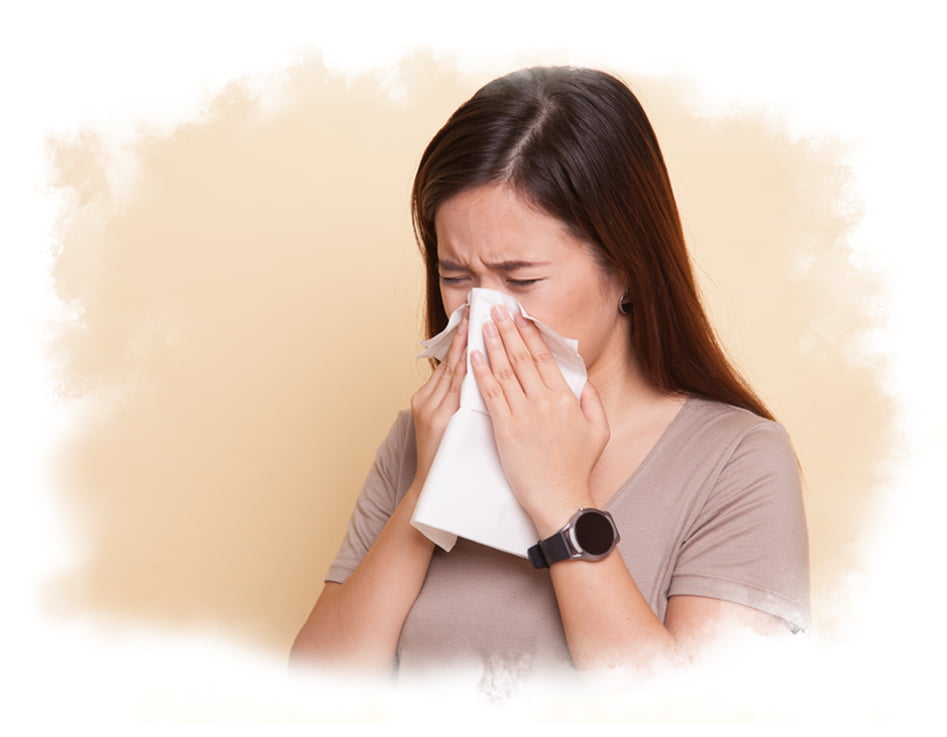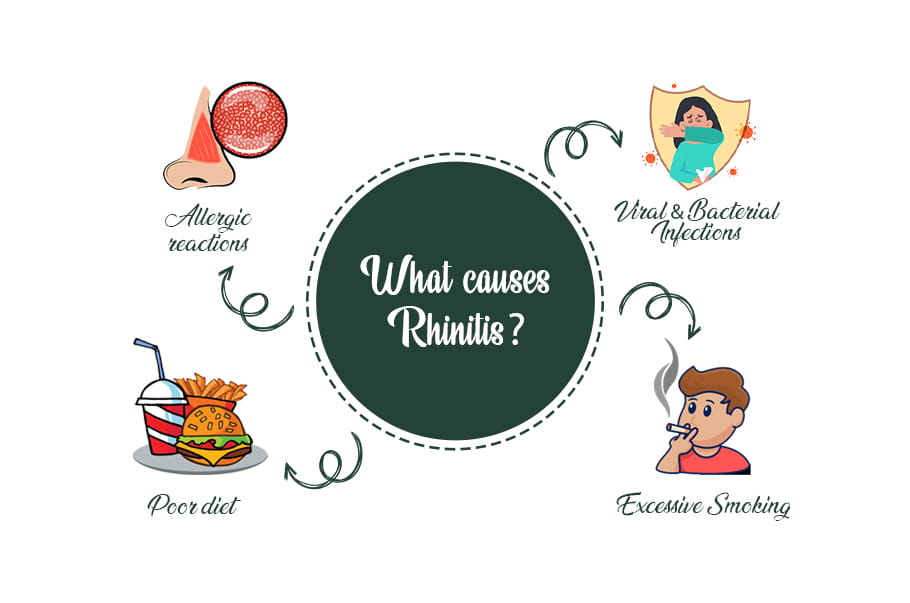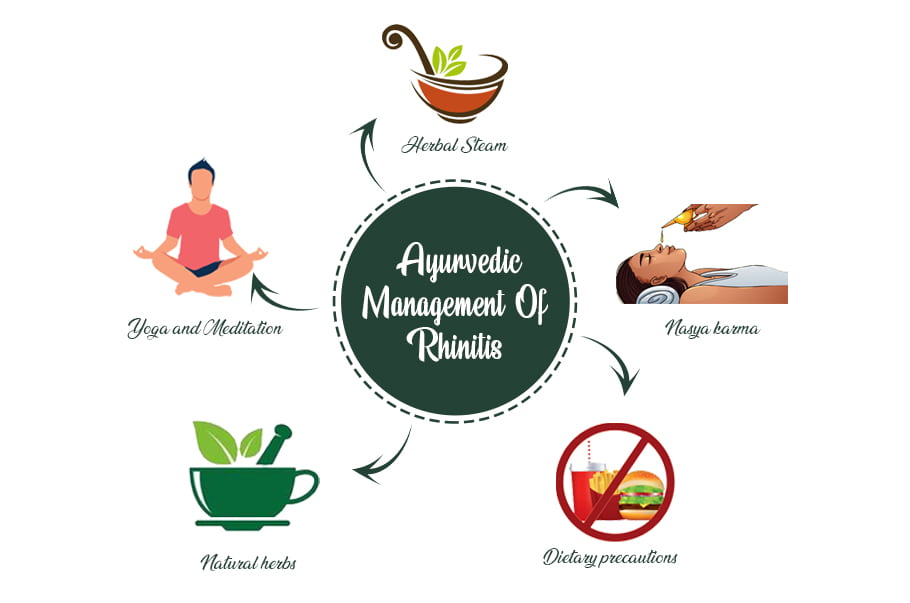The season is changing!
It is the time when the earth turns into heaven with a beautiful sky, rainbows, soothing winds, and the gratifying fragrance of soil.
But you know what?
This heavenly season also brings a lot of afflictions. The health-related issues reach their peak that shows no mercy whether it is a kid, teen, youngster, or an aged person. One of these health complaints is Rhinitis- which is an intolerable respiratory disease.
In Ayurveda, it is known as “Pratishyaya Roga” which is caused by the imbalance of Vata Dosha and Kapha Dosha in the body. Allergic rhinitis treatment in Ayurveda is based on treating the root causes of this respiratory ailment so that patients can get eternal relief. To know how to cure allergic rhinitis permanently, surely go through this blog.
Rhinitis

Rhin means nose and itis means Inflammation. As the same is indicating itself that this respiratory disease mainly affects the nasal region. It causes irritation and inflammation of the mucous membrane in the nose. In addition to the nose, it also adversely affects the eyes, ears, throat, and overall upper respiratory system.
Types of Rhinitis
On the basis of causative factors and duration, rhinitis can be categorized into two types, namely:
Allergic Rhinitis
Rhinitis which is caused by external environmental factors or allergens is called Allergic rhinitis. Pollen, pet dander, dust mites, fumes, mold spores, or skin flakes of animals can be responsible for this type of rhinitis. Allergic rhinitis mainly occurs seasonally or year-round.
Non-Allergic Rhinitis
When rhinitis is caused by non-allergen factors such as excessive alcohol, smoking, and a poor or spicy diet, then it is known as Non–allergic rhinitis. Most of the time non-allergic rhinitis gets fine within 3 to 7 days, but in some cases, it can last for extended periods.
Signs of Rhinitis
Runny, congested, or blocked nose, sneezing, red or watery eyes, itchy throat, pain in the sinuses, nosebleeds, and snoring are certain symptoms that patients with Rhinitis generally experience. However, allergic rhinitis symptoms can vary from person to person depending on the causative factors of rhinitis, and their internal immunity power. In some cases, the patient’s heartbeat also gets increased because of frequent chest pain and tightness.
If you are experiencing any of these signs, then it is better to opt for allergic rhinitis treatment.
What causes Rhinitis?
 There could be several reasons behind the occurrence of rhinitis and some of these causative factors are as follows:
There could be several reasons behind the occurrence of rhinitis and some of these causative factors are as follows:
Allergic reactions
Environmental factors and allergens such as pollen, dust mites, pet dander, cockroach residue, perfumes, fungi, and chemical-based beauty products have adverse effects on the respiratory system. Coming in contact with these allergens can result in rhinitis.
Viral & Bacterial Infections
Bacteria and viruses invade the nasal cavity by creating an inflammatory response. This inflammation causes the mucous membranes to produce more mucus than usual, which leads to a runny, congested, and irritated nose, throat, and other respiratory complications.
Excessive Smoking
Smoking is yet another significant factor contributing to the development of this respiratory ailments. The smoke of tobacco and cigarettes increases the risk of lgE medicated allergen sensitization, which triggers diseases such as rhinitis and asthma.
Poor diet
Your intake has a prominent impact on the severity of rhinitis symptoms. The consumption of excessively hot, spicy, and processed foods swells the inner linings of your nasal passage. Therefore, it is not only the immune system that is responsible for producing histamine, in fact, it can be derived from our daily foods and drinks as well. It is highly advised to restrict the consumption of non-vegetarian, junk, and processed food items.
Follow these Ayurvedic Remedies and Tips, If you are suffering from Seasonal Allergies.
Rhinitis relation with body governing doshas
Ayurveda believes that there are five body elements, i.e. Prithvi, Jala, Agni, Vayu, and Akasha. Three prominent Dosha namely Vata, Pitta, and Kapha dosha are responsible for maintaining a balance between these body elements for the growth and survival of the human body. Whenever these doshas get imbalanced, they give birth to diseases.
Rhinitis is considered a Vata-Kapha-dominated disease, which is to say when the Vata Dosha (Akasha and Vayu) and Kapha Dosha (Prithvi and Jala) get aggravated, rhinitis tends to occur.
Ayurvedic Management Of Rhinitis
 Rhinitis treatment in Ayurveda is based on the philosophy of body dosha management. As discussed earlier, Ayurveda believes that the imbalance of Vata Dosha and Kapha Dosha is the prime factor for this respiratory ailment. It tries to re-establish a balance between the doshas using herbal manners such as home remedies, dietary precautions, yoga, and meditation. Following is a brief of these natural ways of treating this respiratory disease:
Rhinitis treatment in Ayurveda is based on the philosophy of body dosha management. As discussed earlier, Ayurveda believes that the imbalance of Vata Dosha and Kapha Dosha is the prime factor for this respiratory ailment. It tries to re-establish a balance between the doshas using herbal manners such as home remedies, dietary precautions, yoga, and meditation. Following is a brief of these natural ways of treating this respiratory disease:
Natural herbs
In Ayurveda, herbs are contemplated as antidotes for several diseases. Herbs such as Tulsi, Haldi, Ashwagandha, Amla, Guggulu, Adraka, Lavanag, and Mulethi are considered best for respiratory ailments. These herbs have anti-inflammatory, anti-biotic, and anti-bacterial properties that boost respiratory health and enhance the overall harmony of the body.
Dietary precautions
Allergic rhinitis treatment in Ayurveda also suggests limiting excessively hot and spicy foods. The consumption of these adversely affects the trigeminal sensory nerve which in turn leads to a runny, or congested nose. Also, limit the consumption of non-vegetarian and dairy products as they support bacterial growth, and mucus production inside the body.
Try adding fresh fruits, and vegetables to your regular meals. Broccoli, onions, ginger, garlic, fenugreek, brussels sprouts, cauliflower, cabbage, kale, tomato, pineapple, grapefruit, apple, and lime are some good options that can be taken to treat allergic rhinitis.
Herbal Steam
This is yet another significant way of ensuring relief against this discomforting disorder. Steam when inhaled opens up the respiratory path by loosening the mucus membranes.
To make herbal steam add 1 spoon of carom seeds (ajwain), 1 tsp. Of turmeric powder (haldi), and 4-5 leaves of basil (tulsi), & mint (pudina) into 1 container of boiling water. These herbs are rich in anti-inflammatory properties that will surely help you to get rid of rhinitis. You have to cover your Crown Chakra (Head portion) with a towel and inhale the air for approximately 10 minutes.
Nasya karma
This measure has been used since ages to get rid of nasal and throat problems such as nose blockage, pain, and throat irritation. Ayurveda's recommendation is to use cow’s ghee or almond oil for this nasya procedure. Both the oilments are very beneficial for the overall harmony of the body, mind, and soul. When poured via the nostrils, they work as marvelous lubricants that soothe inflammation & irritation inside the respiratory system.
You can put 2-3 drops of cow’s ghee or almond oil twice a day in each of your nostrils.
Yoga and Meditation
Allergic rhinitis treatment in Ayurveda also recommends yoga, pranayama, and meditation to your daily lifestyle. Performing yoga improves respiratory health by removing the blockage caused in the nasal passages, whereas meditation makes the mind calm and provides inner strength to cope with the distress and discomfort caused by diseases.
Following are the 5 best asanas that can be used in allergic rhinitis treatment:
- Kapalbhati
- Bhramari
- Anuloma Viloma
- Bhastrika Pranayama
- Surya Bhedana
Ayurveda being a holistic approach to medicine never fades your hope. No artificial substances or chemicals are used in Ayurvedic treatment at all, thus there are nil chances of side effects. It also provides the facility of easy accessibility as most of the ingredients of herbal remedies can be usually availed in kitchens or gardens. Unlike other treatments, Ayurveda treats the disorder from its root factors and ensures long-term, and eternal relief to the patient. If you are looking for the allergic rhinitis best treatment, then you can surely opt for Ayurveda.
Takeaway
Living with diseases should never be an option. Apart from the physical pain, it can add to psychological discomfort and tiredness. Make a better choice and hold the hands of Ayurveda now. Its harmonious nature and human-body wellness properties will surely help you to achieve the dream of happy, healthy, and disease-free living.
FAQ
Can Ayurveda cure rhinitis?
Yes! With Ayurvedic treatment, rhinitis can be cured. Ayurveda aims at removing respiratory blockage and providing eternal relief to the patient. All it takes are the adoption of herbal remedies, dietary precautions, and yoga asanas.
How do you treat rhinitis naturally?
Adopting herbal remedies, performing yoga & meditation, and taking steam along with certain necessary diet precautions are some natural ways of treating rhinitis. Make these little efforts in your life and see the mind-blowing results.
What oil is good for rhinitis?
The oil of Sandalwood (Chandana), Frankincense (Loban), Ravensara (Arandi), Peppermint (Pudina), and Rosemary (Rujamari) are considered to be the best for respiratory problems due to their antibacterial, anti-inflammatory, and antibiotic properties. In addition to herbal oilments, cow’s desi ghee has been also proven immensely beneficial for rhinitis.
What to avoid in rhinitis?
Firstly, if you are allergic to any substances such as pollen, dust, mites, fungi, woolen, or pet danders, then avoid coming in contact with these allergens. Also, avoid non-vegetarian, junk, dairy, and excessively hot & spicy food items.
How do you know if you have rhinitis?
If you have rhinitis, then you will experience symptoms such as a blocked or runny nose, itchy throat, sneezing, snoring, headaches, or sometimes even nose bleeding.
